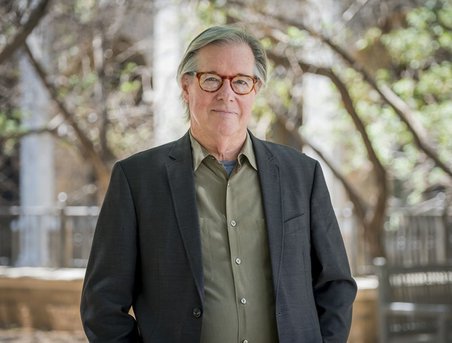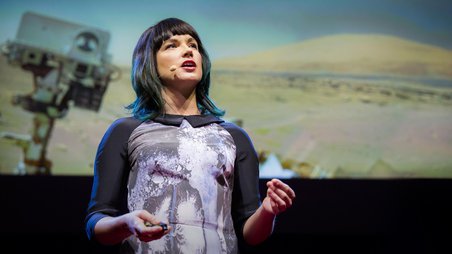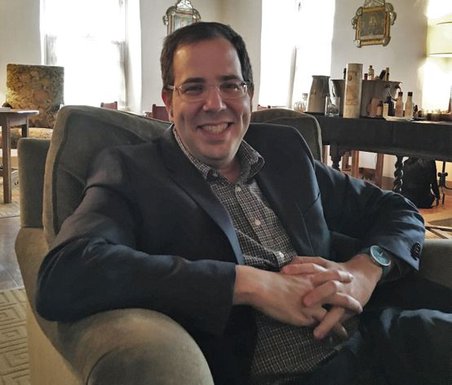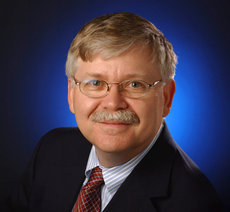-
Baruch S. Blumberg NASA/Library of Congress Chair in Astrobiology
February 11, 2019
About The Position
Established in the Fall of 2011, the Baruch S. Blumberg NASA/Library of Congress Chair in Astrobiology is a distinguished senior position at the Library’s John W. Kluge Center in Washington DC. The chair is named for the late Nobel Laureate and founding director of the NASA Astrobiology Institute, Baruch “Barry” Blumberg.
Blumberg was awarded the 1976 Nobel Prize in physiology or medicine for discovery of the Hepatitis B virus and development of a vaccine to prevent Hepatitis B infection. He served as the NASA Astrobiology Institute director from 1999 to 2002. The institute’s mission is to promote interdisciplinary research in astrobiology, train the next generation of astrobiologists, provide scientific and technical leadership for NASA space missions, and share astrobiology’s discoveries with learners of all ages.
At the Library of Congress, Blumberg was a founding member of the Scholar’s Council, a 12-member group of distinguished scholars that advises the Librarian of Congress on matters of scholarship.
An annual international competition is held to select a chairperson, who then serves in residence at the Kluge Center for up to one year.
About The Chairs

Bruce Clarke
Bruce Clarke, the Paul Whitfield Horn professor of literature and science in the Department of English at Texas Tech University, began his ten month residence at the Kluge Center on December, 2018. His research focuses on 19th- and 20th-century literature and science, with special interests in systems theory, narrative theory and ecology.
At the Library, he will work on a project titled “Astrobiology, Ecology and the Rise of Gaia Theory.” The Gaia theory postulates that the Earth’s living and nonliving components form a self-regulating planetary system. This provides a model for understanding viable conditions for life on our home planet and for the detection of life on other worlds. A key component of Clarke’s research will be to study the work of the late American evolutionary thinker Lynn Margulis. Her collaboration on the Gaia hypothesis with the British atmospheric chemist James Lovelock received crucial NASA funding in its formative decades.

Lucianne Walkowicz
Lucianne Walkowicz, astronomer based at the Adler Planetarium, began her residency with the Kluge Center on October 1, 2017.
As the fifth Chair, Walkowicz is working on a project entitled “Fear of a Green Planet: Inclusive Systems of Thought for Human Exploration of Mars.” Her project will create an inclusive framework for human exploration of Mars—a vision that encompasses both cutting-edge research on Mars as a place of essential astrobiological significance and weaves in lessons from the diverse histories of exploration on Earth. In addition to studying stellar magnetic activity and the effect on planetary suitability for extraterrestrial life at Adler Planetarium, Walkowicz is a TED senior fellow and artist.

Luis Campos
Luis Campos served his one-residency as the fourth Chair beginning Oct. 3, 2016. A historian of science, Campos is currently Associate Professor of History at The University of New Mexico. He is the author of “Radium and the Secret of Life” and is co-editor of “Making Mutations: Objects, Practices, Contexts.”
While at the Kluge Center, Campos used the Library collections to examine the intersection between astrobiology and synthetic biology. Synthetic biology, according to Campos, seeks to engineer novel forms of life. Astrobiology is interested in discovering novel forms of life.
 Nathaniel Comfort of the Johns Hopkins Department of the History of Medicine. Credit: Johns Hopkins
Nathaniel Comfort of the Johns Hopkins Department of the History of Medicine. Credit: Johns HopkinsNathaniel Comfort
A well-known historian of recent science, biology and biomedicine, Nathanial Comfort began his residence as the third Chair, October 1, 2015. As Astrobiology Chair, Comfort used the Library’s collections to examine the history of the genomic revolution in origin-of-life research, addressing one of the central areas of inquiry in the field of astrobiology, which in addition to the search for life elsewhere in the universe, is deeply interested in how life began and evolved here on Earth. Comfort is currently a Professor at the Institute of the History of Medicine at The Johns Hopkins University.

Steven J. Dick
In May, 2013, Steven Dick was selected as the second Chair and began his residence in November 2013. Dick was the Charles A. Lindbergh Chair in Aerospace History at the Smithsonian Institution’s National Air and Space Museum. He is an astronomer, author and historian who served as the chief historian for NASA from 2003 to 2009. Earlier, he was an astronomer and historian of science at the U.S. Naval Observatory in Washington, D.C.
His focus as Chair was examining the historical impact of astrobiology. He worked individually and with other scholars to determine systematically the critical issues and optimal approaches to studying the societal impact of the discovery of microbial or intelligent extraterrestrial life. He aims to publish his findings for wider consumption at the end of his stay.

David H. Grinspoon
David Grinspoon was selected as the first Baruch S. Blumberg NASA/Library of Congress Chair in Astrobiology. His year at the Kluge Center was from November 2012 – November 2013. He is the curator of astrobiology in the Department of Space Sciences at the Denver Museum of Nature and Science. Grinspoon is a well-known researcher in planetary science and the author of the award-winning book “Lonely Planets: The Natural Philosophy of Alien Life.”
Grinspoon’s focus as Chair was to examine choices facing humanity as we enter the Anthropocene Era, the epoch when human activities are becoming a defining characteristic of the physical nature and functioning of Earth. His research included studies of the role of planetary exploration in fostering scientific and public understanding of climate change and the power of astrobiology as a model of interdisciplinary research and communication.
Activities
- Published in 2018 and awarded the Professional and Scholarly Excellence (PROSE) Award in January 2019, Steven J. Dick’s book Astrobiology, Discovery, and Societal Impact presents a study of how the discovery of life beyond Earth might impact society and our view of the universe, based on research at the Library of Congress.
- September 28, 2017, Luis Campos presented the symposium: Life As It Could Be: Astrobiology, Synthetic Biology, and the Future of Life
- October 3, 2016, Nathaniel Comfort presented an NAI Director’s Seminar Bowling with Astrobiologists: A Twisted Path Toward the Origin of DNA
- September 15, 2016, The Emergence of Life: On Earth, in the Lab, and Elsewhere. Hosted by Astrobiology Chair Nathaniel Comfort, this symposium brings together scientists, humanists, and authors to explore what we know about the origins of life, how we came to know it, and what it means. Events are held inside the historic Library of Congress Thomas Jefferson Building.
- March 17, 2016, The Origins of the RNA World. NASA/Library of Congress Chair in Astrobiology Nathaniel Comfort convened four distinguished scientists on-stage for a live oral history interview about the origins of the RNA world, the world at the dawn of life, before DNA, arising nearly four billion years ago. Comfort interviewed the scholars about their roles in developing a key model for the origins of life—on Earth and beyond. Participating scholars: Dr. W. Ford Doolittle – Professor Emeritus, Dalhousie University, Dr. George E. Fox – Professor, University of Houston, Dr. Ray Gesteland – Distinguished Professor Emeritus, University of Utah, Dr. Walter Gilbert – Nobel Laureate in Chemistry, 1980; University Professor, Harvard University
- Published in 2015, the book The Impact of Discovering Life Beyond Earth is the product of a Symposium convened at the Library of Congress by Steven Dick in his capacity as the 2014 Baruch S. Blumberg NASA/Library of Congress Chair in Astrobiology.
- September 18-19, 2014, the Second Annual Astrobiology Symposium titled Preparing For Discovery: A Rational Approach to the Impact of Finding Microbial, Complex, or Intelligent Life Beyond Earth was hosted by The John W. Kluge Center at The Library Of Congress in cooperation with the NASA Astrobiology Program. View the program here
- September 15, 2014, in a new video interview with C-SPAN’s American History TV, chair Steven Dick explains how history, discovery, and analogy may be useful frameworks for approaching the problem of what societal reactions may be to the discovery of life beyond Earth.
- June 18, 2014, a Kluge Conversations Astrobiology & Theology: A Discussion took place at the Kluge Center at the Library of Congress. Discoveries of new, potentially habitable worlds beyond our solar system raise challenging questions for humanity vis-à-vis faith, human nature, reality and religion. The event addressed the complex intersection of astrobiology and theology and features the Library’s current Astrobiology Chair Dr. Steven J. Dick in conversation with prominent theologian Dr. Robin Lovin. Read the news release at: http://www.loc.gov/today/pr/2014/14-091.html
- January 28, 2014, the two NASA/Library of Congress Astrobiology Chairs David Grinspoon and Steven Dick addressed the topic of Searching for Life in the Universe: What Does it Mean for Humanity? Watch a video of the entire event here: http://youtu.be/8FweCQJ80kc
- December 4, 2013, Blumberg Chair Steven Dick provided Congressional testimony at a full committee hearing Astrobiology: Search for Biosignatures in our Solar System and Beyond Watch the webcast here: http://science.house.gov/hearing/full-committee-hearing-astrobiology-search-biosignatures-our-solar-system-and-beyond
- September 12, 2013, Blumberg Chair David Grinspoon was the moderator for the panel discussion The Longevity of Human Civilization: Will we Survive our World-Changing Technologies?
- February 28, 2013, Blumberg Chair David Grinspoon was a panel speaker at The Evolving Moral Landscape: Perspectives on the Environment – Literary, Historical and Interplanetary.
- Job/Funding Board
- NASA Astrobiology Postdoctoral Program
- The Lewis and Clark Fund for Exploration and Field Research in Astrobiology
- NASA Astrobiology Early Career Collaboration Award
- Baruch S. Blumberg NASA/Library of Congress Chair in Astrobiology
- NASA Astrobiology Faculty Diversity Program (formerly MIRS)
- NAI Director’s Discretionary Fund
- NASA Astrobiology Conference and Workshop Fund